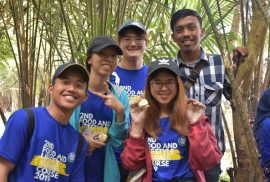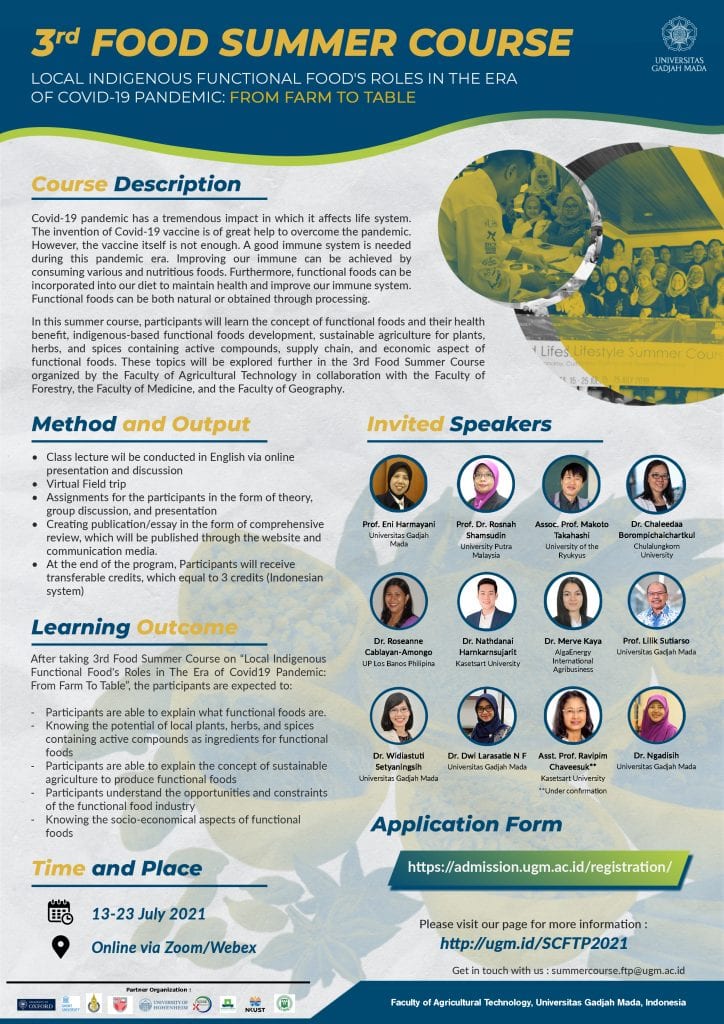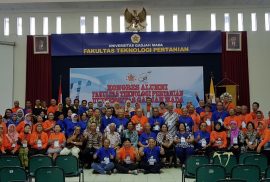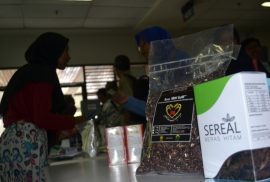The eighth day of the 3rd summer course on food with the theme of Local Indigenous Functional Food’s Roles in The Era of Covid-19 Pandemic: From Farm to Table has taken place. On this day, the activity was divided into 4 sessions including in-depth material elaboration by Prof. Dr. Muhammad Shahrim Karim from University Putra Malaysia, Assoc. Prof. Dr. Parthana Parthanadee from Kasetsart University, Prof. Takuya Sugahara from Ehime University and Dr. Realm Kohler geb. Alis from University of Hohenheim.
In the first session, the lecture was delivered by Prof. Dr. Muhammad Shahrim Karim about “Indigenous Functional Foods in Malaysia: Challenges and Practices in Functional Food Preparation”. This session was led by Dr. Arima Diah Setiowati, S.T.P., M.Sc.. Prof. Shahrim explained about nutrition function and health benefits from functional food products, the sources of functional food, herbal market trend as functional food, the source of modern herbal supplements and the emerging trends in functional food amidst the Covid-19 Pandemic.
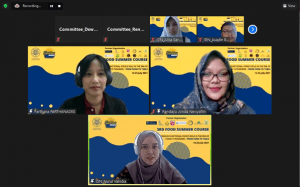 In the second session, the lecture was delivered by Assoc. Prof. Dr. Parthana Parthanadee about “Supply Chain and Logistics Analysis of Functional Foods Industry”. This session was led by Rendayu Jonda Neisyafitri, S.T.P., M.Sc. Prof. Parthana explained the drivers of supply chain and metrics in terms of responsiveness and efficiency, types of facilities, components of facilities, the role of facilities, inventory, transportation, data and analysis, price and the supply chain. The main process of supply chain includes planning, source and resources, create, deliver and returns. In addition, the supply chain operations structure consists of four major sections including performance, processes, practices, and people. By the end of his lecture, Prof. Parthana described the characteristics of agri-food supply chains that need to be taken into deliberate consideration when evaluating the resilience, including biological processes, perishability, structure, necessity, and system’s perspective.
In the second session, the lecture was delivered by Assoc. Prof. Dr. Parthana Parthanadee about “Supply Chain and Logistics Analysis of Functional Foods Industry”. This session was led by Rendayu Jonda Neisyafitri, S.T.P., M.Sc. Prof. Parthana explained the drivers of supply chain and metrics in terms of responsiveness and efficiency, types of facilities, components of facilities, the role of facilities, inventory, transportation, data and analysis, price and the supply chain. The main process of supply chain includes planning, source and resources, create, deliver and returns. In addition, the supply chain operations structure consists of four major sections including performance, processes, practices, and people. By the end of his lecture, Prof. Parthana described the characteristics of agri-food supply chains that need to be taken into deliberate consideration when evaluating the resilience, including biological processes, perishability, structure, necessity, and system’s perspective.
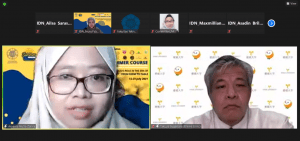 In the third session, the Prof. Takuya Sugahara shared the critical concept and idea about “Functional Foods In Japan: Regulation And Effects On Health”. This session was led by Aryanis Mutia Zahra, S.TP., M.Si. In the beginning of the lecture, Prof. Sugahara brought all the participants to the introduction of Ehime University at glance as he is affiliated at Ehime University. Subsequently, Prof. Sugahara divided his lecture into 3 sub-themes including Functional Food System in Japan, Evaluation of Food Functions, and Health Function of Spice. In Japan, food products were categorized into four groups, which comprise of food in general, foods with health claims, pharmaceutical products, and quasi-pharmaceutical products. In addition, Prof. Sugahara explained the various categories of food functions. In the other hand, Prof Sugahara emphasized that the critical concept of food with health claims is healthy foods that meet standards determined by the government and regulation. In terms of the regulation, functional food is divided into three main categories which include Food with Nutrient Function Claim (FNFC), Food for specified health use (FOSHU) and food with Function Claims (FFC). Food with Nutrient Function Claim (FNFC) is food that is characterized by the role vitamins and minerals added in the food. Food for Specified Health Use (FOSHU) is food that is scientifically recognized for its beneficial health impact, while Food with Function Claims (FFC) is a food which can be indicated with a function claim based on scientific evidence under the supplier’s responsibility.
In the third session, the Prof. Takuya Sugahara shared the critical concept and idea about “Functional Foods In Japan: Regulation And Effects On Health”. This session was led by Aryanis Mutia Zahra, S.TP., M.Si. In the beginning of the lecture, Prof. Sugahara brought all the participants to the introduction of Ehime University at glance as he is affiliated at Ehime University. Subsequently, Prof. Sugahara divided his lecture into 3 sub-themes including Functional Food System in Japan, Evaluation of Food Functions, and Health Function of Spice. In Japan, food products were categorized into four groups, which comprise of food in general, foods with health claims, pharmaceutical products, and quasi-pharmaceutical products. In addition, Prof. Sugahara explained the various categories of food functions. In the other hand, Prof Sugahara emphasized that the critical concept of food with health claims is healthy foods that meet standards determined by the government and regulation. In terms of the regulation, functional food is divided into three main categories which include Food with Nutrient Function Claim (FNFC), Food for specified health use (FOSHU) and food with Function Claims (FFC). Food with Nutrient Function Claim (FNFC) is food that is characterized by the role vitamins and minerals added in the food. Food for Specified Health Use (FOSHU) is food that is scientifically recognized for its beneficial health impact, while Food with Function Claims (FFC) is a food which can be indicated with a function claim based on scientific evidence under the supplier’s responsibility.
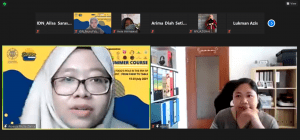 Moving on to the last session, the lecture was delivered by Dr. Realm Kohler geb. Alis about “Indigenous Functional Foods in the Philippines”. This session was led by Aryanis Mutia Zahra, S.TP., M.Si. Dr. Realm opened the lecture by sharing some data about the current health and nutrition in ASEAN. Then she explained about dietary diversification which defined the significance that diet must include sufficient quantity and variety of good quality of food that will cover most of the essential nutrients needed by the body. Southeast Asia (SEA) is considered as the food bowl of Asia which reflected by its huge biodiversity. In addition, Philippines is one of the 17 mega diversity countries in the world. Despite of its resource’s potency, Philippines has no specific regulations for functional foods. In general, some functional foods in Philippines are derived from its diversity of genetical natural resources, such as pigmented rice (brown rice), mangosteen, malunggay, turmeric, coffee, and fish.
Moving on to the last session, the lecture was delivered by Dr. Realm Kohler geb. Alis about “Indigenous Functional Foods in the Philippines”. This session was led by Aryanis Mutia Zahra, S.TP., M.Si. Dr. Realm opened the lecture by sharing some data about the current health and nutrition in ASEAN. Then she explained about dietary diversification which defined the significance that diet must include sufficient quantity and variety of good quality of food that will cover most of the essential nutrients needed by the body. Southeast Asia (SEA) is considered as the food bowl of Asia which reflected by its huge biodiversity. In addition, Philippines is one of the 17 mega diversity countries in the world. Despite of its resource’s potency, Philippines has no specific regulations for functional foods. In general, some functional foods in Philippines are derived from its diversity of genetical natural resources, such as pigmented rice (brown rice), mangosteen, malunggay, turmeric, coffee, and fish.

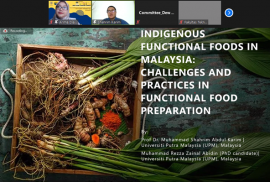
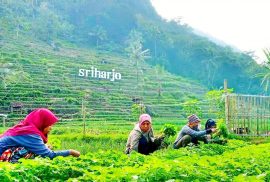
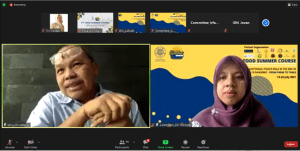 In the second session, the lecture was delivered by Prof. Lilik Sutiarso about “Sustainable Agriculture: a case study in Sriharjo Village”. In his lecture, Prof. Lilik explained about the concept of the bio-circular-green (BCG) economy. The concepts of circular economy, green economy, and bio-economy are joined by the common ideal to reconcile economic, environmental, and social goals. It is a concept that has been developed for a long time. The concept integrates economic, social, and environmental. This concept will provide opportunities including industry, government, and private systems to work together in an interconnected system.
In the second session, the lecture was delivered by Prof. Lilik Sutiarso about “Sustainable Agriculture: a case study in Sriharjo Village”. In his lecture, Prof. Lilik explained about the concept of the bio-circular-green (BCG) economy. The concepts of circular economy, green economy, and bio-economy are joined by the common ideal to reconcile economic, environmental, and social goals. It is a concept that has been developed for a long time. The concept integrates economic, social, and environmental. This concept will provide opportunities including industry, government, and private systems to work together in an interconnected system.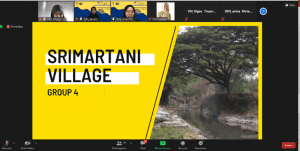 Therefore, the last session was the group presentation based on the results of the brainstorming about the advantages and disadvantages of implementing Agro-ecotourism and the utilization of agricultural machinery of the video that has been conducted in the morning session. This session was guided by Dr. Ngadisih to guide the participant’s group presenting their group discussion regarding the assigned topic by the committee.
Therefore, the last session was the group presentation based on the results of the brainstorming about the advantages and disadvantages of implementing Agro-ecotourism and the utilization of agricultural machinery of the video that has been conducted in the morning session. This session was guided by Dr. Ngadisih to guide the participant’s group presenting their group discussion regarding the assigned topic by the committee.